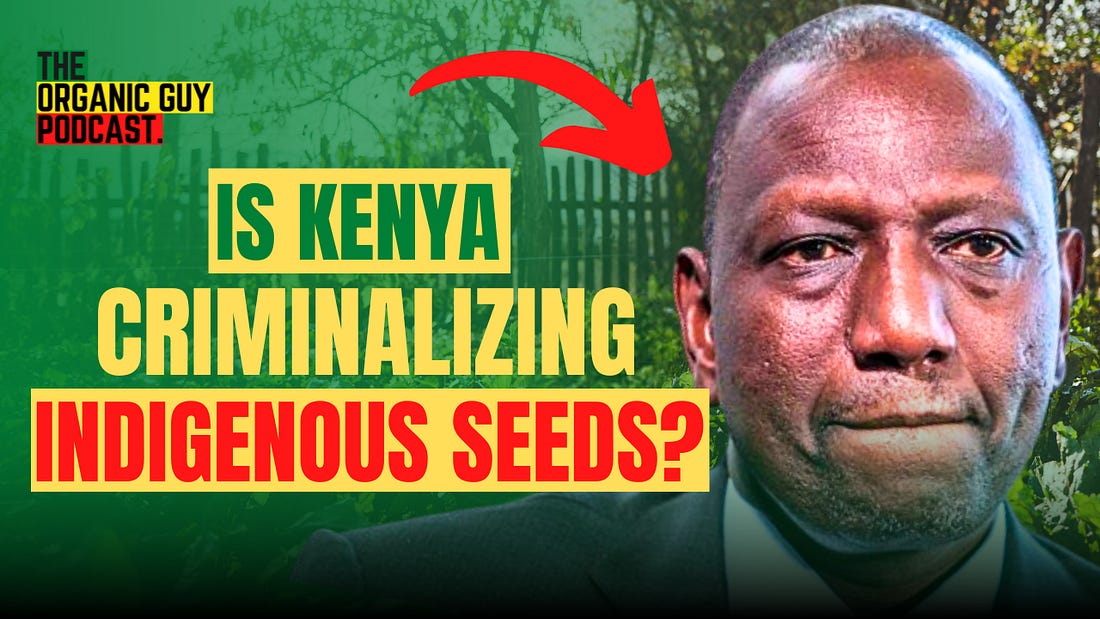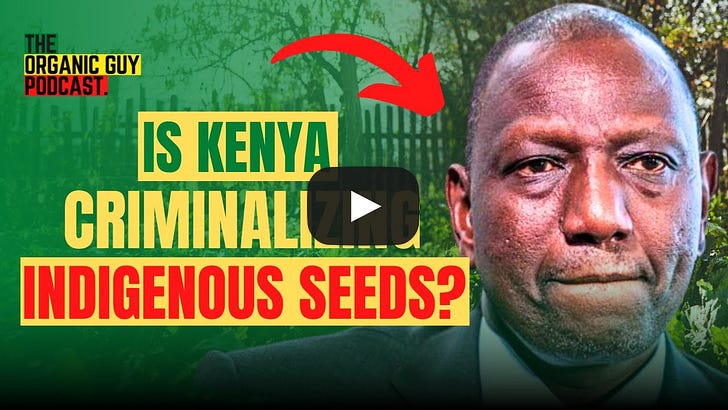OSINT Report: The Legal Threat to Kenya's Seed Sovereignty | Re: Is Kenya Really Banning Indigenous Seeds? w/ Emmanuel Atamba | Ep 074
OSINT Report: The Legal Threat to Kenya's Seed Sovereignty
Report Date: September 30, 2025
Prepared by: Marie-Soleil Seshat Landry with AI
Subject: In-depth analysis of the legal and social conflict surrounding Kenya's Seed and Plant Varieties Act (Cap. 326) and its critical impact on indigenous seeds, biodiversity, and smallholder farmers.
Executive Summary
The Kenya Seed and Plant Varieties Act (Cap. 326), particularly following the 2012 amendments, has created a fundamental conflict between agricultural modernization efforts and traditional farming practices. The law, which mandates fines of up to KES 1 million (approximately $7,750 USD) or two years imprisonment for selling uncertified seeds [cite: 1.2, 1.3], effectively criminalizes the age-old customs of saving, exchanging, and sharing uncertified, indigenous seeds [cite: 4.4].
Key Findings and Value-Adds:
Farmer Dependency: The law targets a system that supplies at least 78% of the seeds used by smallholder farmers in Kenya [cite: 1.2].
Active Litigation: In 2022, fifteen smallholder farmers filed a petition in the High Court challenging the constitutionality of Cap. 326, arguing the provisions violate their rights to culture, property, and human dignity [cite: 4.2, 4.4]. A judgment date of November 27, 2025, has been noted in the public record [cite: 4.2].
Gender Disparity: The punitive provisions disproportionately affect women farmers, who constitute up to 80% of Kenya's agricultural labor force and are the primary custodians of the farmer-managed seed system [cite: 4.5]. Fear of prosecution has already been linked to a reduction in seed saving and a loss of local varieties [cite: 4.5].
Regulatory Conflict: The primary regulator, the Kenya Plant Health Inspectorate Service (KEPHIS), is currently opposing a proposed 2025 amendment to the Act, warning that a dual-certification system with the Kenya Bureau of Standards (KEBS) would compromise seed quality and increase the proliferation of counterfeit seeds [cite: 3.1, 3.2].
1.0 Legal Framework and Economic Stakes
The Seeds and Plant Varieties Act (Cap. 326) governs seed transactions in Kenya, with the Kenya Plant Health Inspectorate Service (KEPHIS) serving as the enforcement body [cite: 3.5]. The core objective is to ensure seed quality and protect Plant Breeders' Rights (PBR) [cite: 3.4].
1.1 Contentious Provisions and Penalties
The controversy centers on the strict, prohibitive clauses inserted through amendments, notably in 2012, which align Kenyan law with international standards like the UPOV 1991 convention [cite: 1.2, 4.4].
Provision | Impact on Traditional Practice | Specifics & Penalties |
Certification Requirement | Requires that any seed sold, bartered, or exchanged must be certified by KEPHIS [cite: 4.4]. This broad definition of "sell" is the functional basis for claims that seed sharing is criminalized [cite: 4.2]. | The vast majority of indigenous seeds cannot meet the "Distinct, Uniform, and Stable" (DUS) requirements necessary for formal certification [cite: 4.4]. |
Enforcement Penalties | Section 10(4) imposes severe deterrents that directly threaten smallholder livelihoods [cite: 1.2]. | Non-compliance can result in a fine of up to KES 1,000,000 or imprisonment for up to two years, or both [cite: 1.3, 4.3]. |
Plant Breeders' Rights (PBR) | PBR are granted for 20 years (25 years for trees/vines) [cite: 1.2]. The law grants breeders exclusive rights over production, sale, import/export, and even harvested material derived from a protected variety [cite: 1.2]. | Critics fear this framework enables biopiracy, where companies could register existing community-used varieties as their own "discovery" [cite: 1.2]. |
2.0 Competing Narratives: Analysis and Evidence
The debate pits two opposing models of food security against one another: the industrial, formal system versus the agroecological, farmer-managed system.
2.1 The "Criminalization of Tradition" Narrative (Opponents)
Key Stakeholders: Alliance for Food Sovereignty in Africa (AFSA), GRAIN, Seed Savers Network, Greenpeace Africa, and petitioner farmers [cite: 1.2, 1.3, 4.2, 4.3].
Core Argument: The law is inherently anti-smallholder, forcing farmers into dependency on expensive, certified commercial seeds and increasing the financial vulnerability of millions [cite: 4.3]. The informal seed system supplies over 80% of the seeds used by small farmers [cite: 4.2]. By discouraging the saving and exchange of diverse, indigenous landraces, the law directly undermines climate resilience and crop biodiversity [cite: 1.2, 4.3].
2.2 The "Nuanced Regulation" Narrative (Proponents)
Key Stakeholders: Kenyan Government (Ministry of Agriculture), KEPHIS, commercial seed companies, and certain agricultural experts [cite: 4.1].
Core Argument: The law is necessary for Quality Control to prevent crop failure caused by low-quality or fraudulent seeds, which the proponents argue is the true threat to farmers [cite: 4.1].
Expert Commentary (Emmanuel Atamba): Sustainable food systems expert Emmanuel Atamba suggests the intent of the law is to target commercial fraud and unscrupulous dealers, not the traditional exchange of seeds between neighbors, advocating for a focus "beyond the slogans" [Original Report].
Enrichment: The 2025 Regulatory Conflict
The government's position is complicated by the ongoing legislative attempt to amend the Act. KEPHIS, the current regulator, is strongly opposing the proposed Seeds and Plant Varieties (Amendment) Bill 2025. KEPHIS argues that introducing the Kenya Bureau of Standards (KEBS) as a co-regulator would duplicate roles, weaken government oversight, and be exploited by cartels to introduce substandard and counterfeit seeds, thereby defeating the law's primary objective of quality assurance [cite: 3.1, 3.2].
3.0 Case Study: The Constitutional Challenge (2022-2025)
The most significant action against the law is the High Court petition filed in 2022 by fifteen smallholder farmers from across the country [cite: 4.2, 4.4].
Legal Basis: The farmers argue that the Act violates the Kenyan Constitution (2010), specifically the right to culture, property, and the intellectual property rights of the people of Kenya [cite: 4.4]. They are also supported by the Law Society of Kenya (LSK), which warned that the law empowers seed inspectors to "raid farmers' homes and seize property" [cite: 4.2].
Petitioner Stance: Justus Mwololo, one of the petitioners, stated, "We're not just defending seeds—we're defending a whole history of resilience" [cite: 4.2].
Actionable Intelligence: The court hearing in mid-2024 was a key development [cite: 4.4], with the date of judgment in the landmark case scheduled for November 27, 2025 [cite: 4.2]. This judicial outcome is set to be a precedent-making case that could either uphold corporate control or significantly shift the policy landscape back toward community autonomy [cite: 4.2].
4.0 Disproportionate Gender Impact
Analysis of the law's societal consequences reveals a severe gender bias, adding a crucial layer of complexity to the human rights implications.
Women as Custodians: Women constitute up to 80% of Kenya's agricultural labor force and are the primary agents for saving, exchanging, and selling seeds within the farmer-managed system [cite: 4.5].
Autonomy and Loss of Income: Because women are the central figures in seed saving, the high penalties and potential jail terms make them the most directly affected by the law's fear and sanctions [cite: 4.5]. This has resulted in women farmers losing access to, and control of, seeds, which directly impacts their autonomy, incomes, and household food security [cite: 4.5].
Unsuitability of Certification: The strict DUS requirements for certification are incompatible with the naturally diverse genetic material of indigenous seeds, effectively excluding women from the formal commercial sector [cite: 4.5].
5.0 Recommendations for Action
Based on the evidence of legal conflict, constitutional challenge, and socioeconomic impact, the following actionable recommendations are proposed for key stakeholders to ensure regulatory policy balances commercial interests with national food security and farmer rights.
5.1 For the Kenyan Government (Parliament & Ministry of Agriculture) 🏛️
Enact a Legislative Exemption: Amend Cap. 326 to introduce a mandatory, clearly defined Farmers' Privilege clause (as recognized under the International Treaty on Plant Genetic Resources for Food and Agriculture - ITPGRFA) [cite: 3.3, 3.4]. This clause must explicitly exempt smallholder farmers and peasant communities from penalties for the saving, use, exchange, and non-commercial local sale of indigenous, uncertified seeds [cite: 1.2, 3.4].
Integrate Farmer-Managed Systems: Develop a two-tiered regulatory system that provides a simplified, low-cost registration pathway for landraces and indigenous seeds, focusing on characteristics relevant to local resilience rather than the strict Distinct, Uniform, and Stable (DUS) standards [cite: 1.8, 3.6].
Align with Constitutional Rights: Await the outcome of the November 27, 2025, High Court ruling and commit to fully harmonizing the Act with Article 43 (Right to Food) and Article 40 (IP Rights of the people) of the Kenyan Constitution [cite: 4.4].
5.2 For Regulators (KEPHIS) 🔎
Focus Enforcement: Officially communicate that enforcement efforts will be exclusively focused on large-scale commercial fraud (counterfeit seeds) and the illegal sale of protected, certified varieties, rather than traditional, localized farmer activities [Original Report].
Facilitate Local Certification: Dedicate resources to working with farmer groups and agricultural research organizations (like KALRO) to develop Community Seed Certification programs for specific indigenous crops, providing training and technical support rather than punitive inspection [cite: 1.8].
5.3 For Farmers and Civil Society Organizations (CSOs) 🌱
Amplify Legal Pressure: Continue coordinated legal advocacy in support of the High Court petitioners and prepare to advocate for immediate legislative change based on the final judgment [cite: 4.2, 4.4].
Document and Map Seed Systems: Intensify efforts to document and geographically map the genetic diversity and traditional knowledge associated with indigenous seed varieties to establish a public, sui generis registry that can be used to legally challenge future attempts at biopiracy and PBR infringement [cite: 1.8].
5.4 For the Commercial Seed Sector 💰
Invest in Relevant Breeding: Shift a portion of R&D investment toward developing heterogeneous varieties suitable for agroecological and smallholder contexts, moving beyond the DUS model [cite: 3.2].
Respect Farmer Privilege: Proactively adopt a corporate social responsibility policy that waives legal action against smallholder farmers for using, saving, or exchanging protected seeds, focusing instead on commercial competitors and fraudulent distribution networks [cite: 1.7].
6.0 Conclusion
The OSINT confirms that Cap. 326 is not merely a bureaucratic regulation but a source of direct, existential risk for Kenya's smallholder farmers, particularly women. The core conflict is a verifiable legal threat to the food system's primary seed supply: the farmer-managed system. The law's ambiguity and severe penalties have generated a chilling effect on traditional practices [Original Report]. All future analysis must track the November 27, 2025 judgment, as the High Court's ruling will determine the balance between private breeder rights (UPOV 1991 compliance) and the constitutional commitment to farmer rights and cultural heritage.
7.0 References
CAP. 326 - Kenya Law Reports [cite: 1.1].
Seeds of Discontent – Kenya's Seed Law Undermines Farmers' Resilience - The Elephant [cite: 1.2].
Punitive Seed Laws Protect Big Corporations Over Kenya's Farmers - Greenpeace Africa [cite: 1.3].
SEEDS AND PLANT VARIETIES ACT - FAOLEX Database [cite: 1.4].
[Rev. 2012] CAP. 326 Seeds and Plant Varieties - FAOLEX Database [cite: 1.5].
Emmanuel Atamba - Berlin - TMG Think Tank for Sustainability [cite: 2.1].
NEXT On The Pod: Emmanuel Atamba, Food Systems Expert - YouTube [cite: 2.2].
Is Kenya Criminalizing Traditional Seeds? w/ Emmanuel Atamba | Ep 074 - YouTube [cite: 2.3].
Emmanuel Atamba - The Standard [cite: 2.4].
Exploring pathways for governing food systems transformation (FST) in Kenya - TMG Think Tank [cite: 2.5].
KEPHIS opposes proposed Seeds and Plant Varieties Bill 2025 - KBC Digital [cite: 3.1].
KEPHIS opposes seed Bill, warns of weakened oversight, rise in counterfeit seeds - Sacco Review [cite: 3.2].
THE KENYA PLANT HEALTH INSPECTORATE SERVICE ACT [cite: 3.3].
Plant Variety Protection: A path to agricultural development in Kenya - Strathmore University [cite: 3.4].
Policy, Legal and Regulatory Country: Kenya - CESSA [cite: 3.5].
The Effectiveness of Seed Certification and Variety Protection Management Systems on Seed Maize Quality and Market Integrity - Paper Publications [cite: 4.1].
Kenyan farmers, civil society, and advocates take seed fight to court in landmark case for food sovereignty - Greenpeace Africa [cite: 4.2].
Inside Kenya's Seed Control Battle: Why Smallholder Farmers Want to Share Indigenous Seeds - ReliefWeb [cite: 4.3].
Kenyan Farmers Challenge the Constitutionality of Seed Law - Defending Peasants' Rights [cite: 4.4].
The impact of Kenyan seed laws on women - CAFOD [cite: 4.5].
Marie-Soleil Seshat Landry (2025). OSINT Report: The Controversy Surrounding Kenya's Seed and Plant Varieties Act (Cap. 326) (Original Report). [Provided Context].
Kenya's smallholder farmers are challenging a law preventing them from sharing indigenous seeds - Global Voices [cite: 1.8].
The Right to Seeds in Africa - The Geneva Academy of International Humanitarian Law and Human Rights [cite: 3.4].
Full article: Laws and regulations enabling and restricting Africa's vegetable seed sector - Taylor & Francis Online [cite: 3.6].
Research Brief: UPOV 1991 and Trade Agreements - IATP [cite: 3.3].
**Marie Seshat Landry**
* CEO / OSINT Spymaster
* Marie Landry Spy Shop
* Email: ceo@marielandryspyshop.com
* Web: marielandryspyshop.com
0:00 2:07:26
Listen now
Is Kenya Really Banning Indigenous Seeds? w/ Emmanuel Atamba | Ep 074
Is this law protecting Kenya's food system, or leaving it vulnerable to external control?
READ IN APP For generations, farmers in Kenya have saved, shared, and exchanged seeds — practices rooted in community, resilience, and survival. But today, the Seed and Plant Varieties Act (Cap. 326) has cast a long shadow, with many activists warning that it criminalizes these very traditions. With penalties of up to 1 million shillings or two years in jail, the fear is real — and the future of seed sovereignty feels uncertain.
Is Kenya Criminalizing Traditional Seeds? w/ Emmanuel Atamba | Ep 074
The Organic Guy
Episode
Enter Emmanuel Atamba, a sustainable food systems expert who has spent years at the frontlines of this conversation. In our latest episode of The Organic Guy Podcast, Atamba challenges the dominant narrative, arguing that the law is far more nuanced than most people realize. He takes us beyond the slogans and dives deep into what the Act actually says — and doesn't say.
What emerges is a powerful conversation about who controls our seeds, who benefits from the current system, and what's at stake for smallholder farmers. Is this law protecting Kenya's food system, or leaving it vulnerable to external control? Together, we explore how indigenous knowledge, policy, and farmer action can shape a more resilient future.
The Organic Guy™ Newsletter is free today. But if you enjoyed this post, you can tell The Organic Guy™ Newsletter that their writing is valuable by pledging a future subscription. You won't be charged unless they enable payments.
Share
Like
Comment
Restack
© 2025 The Organic Guy
Nairobi, Kenya
Unsubscribe






Comments
Post a Comment